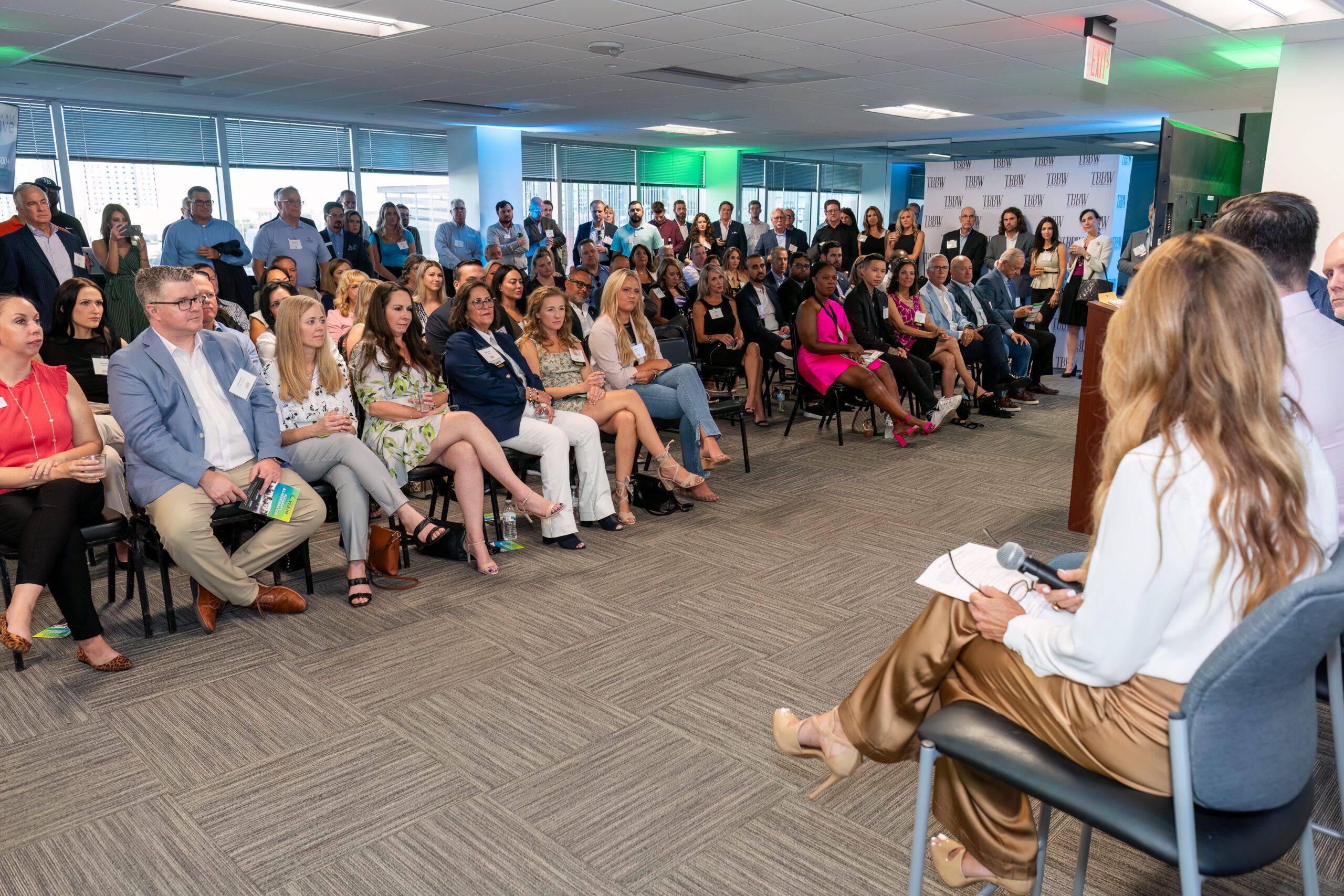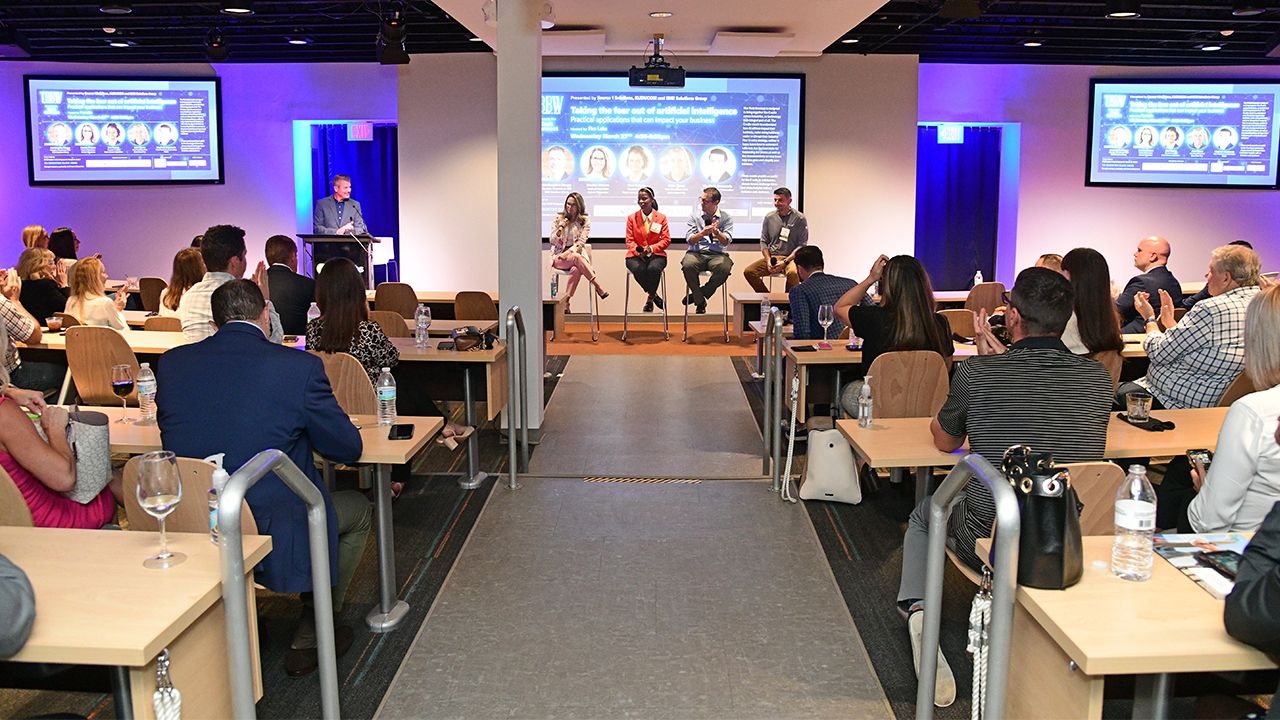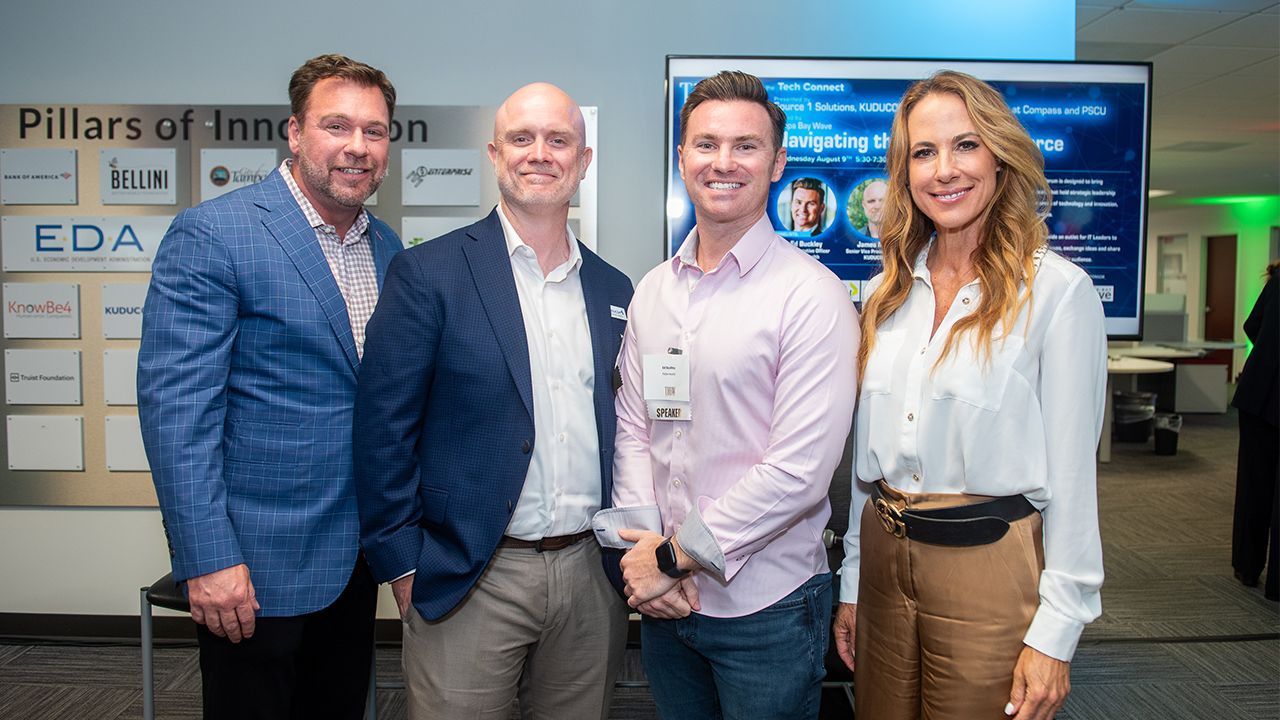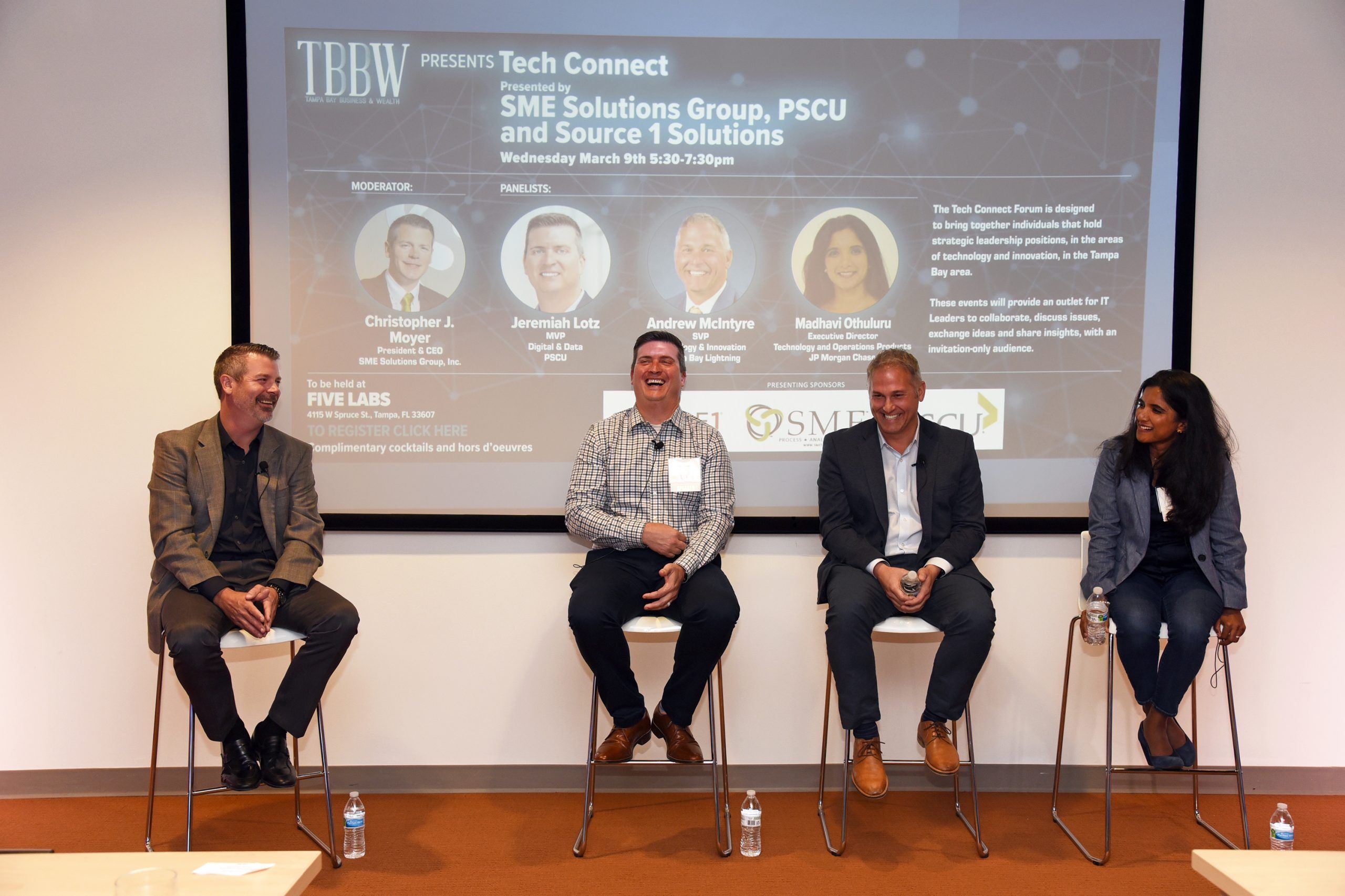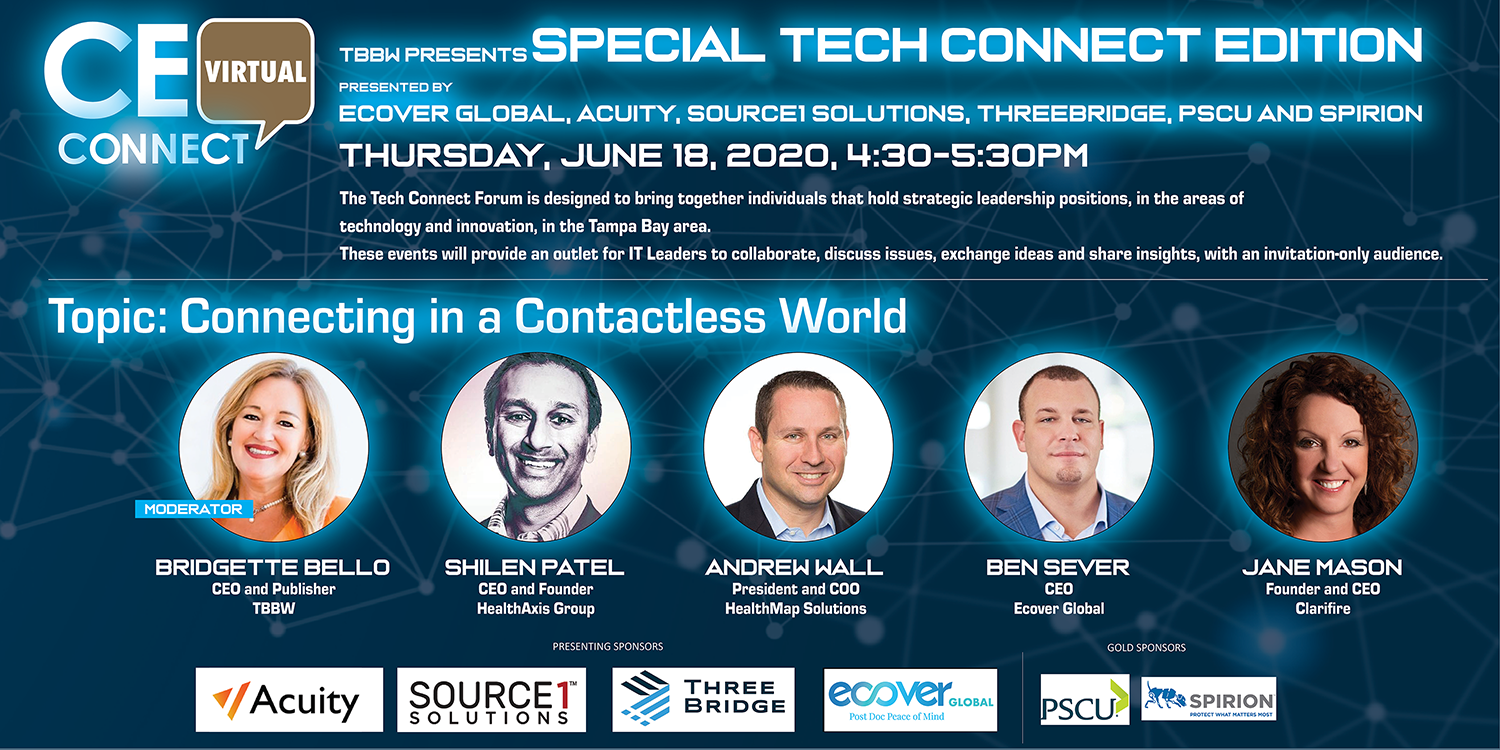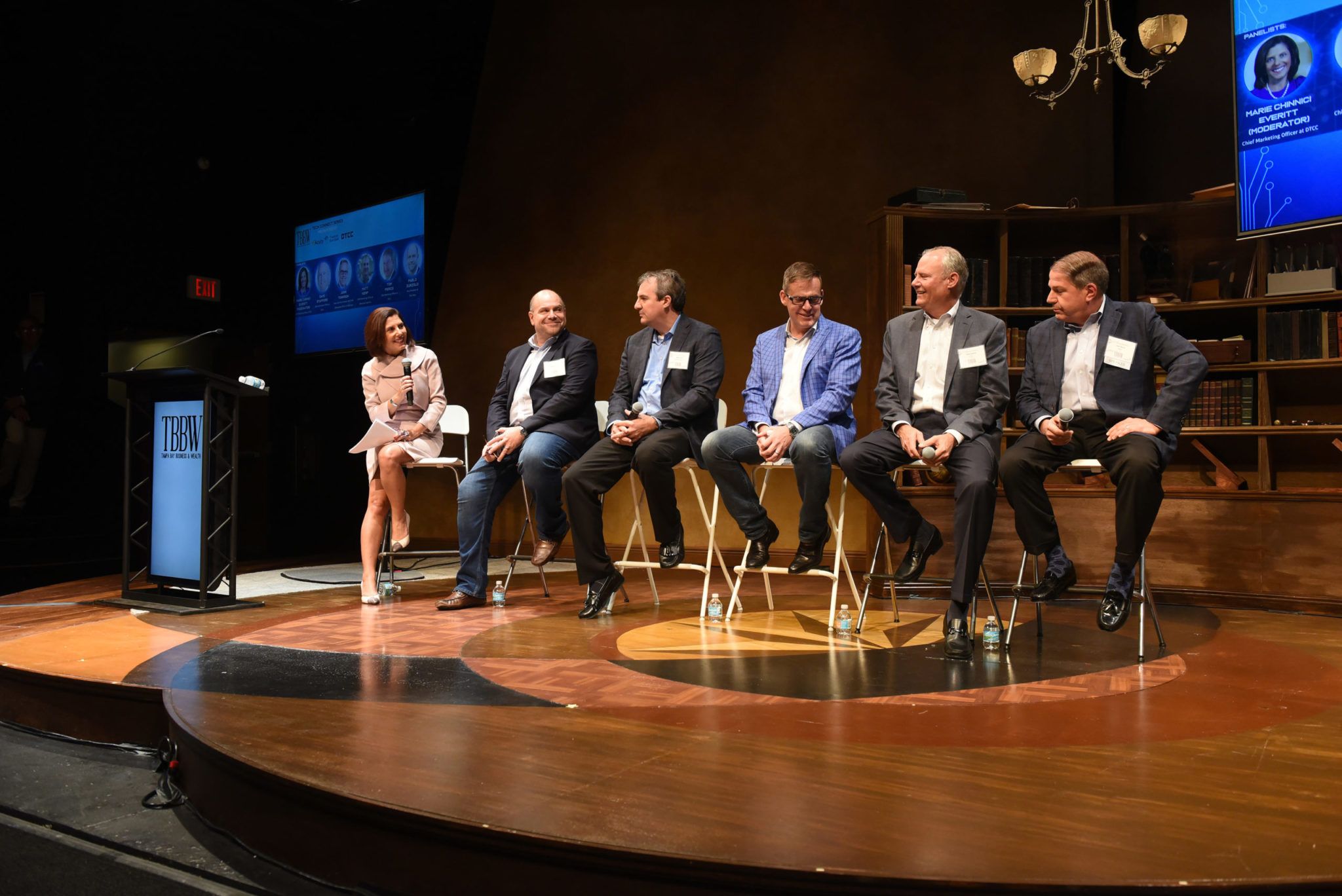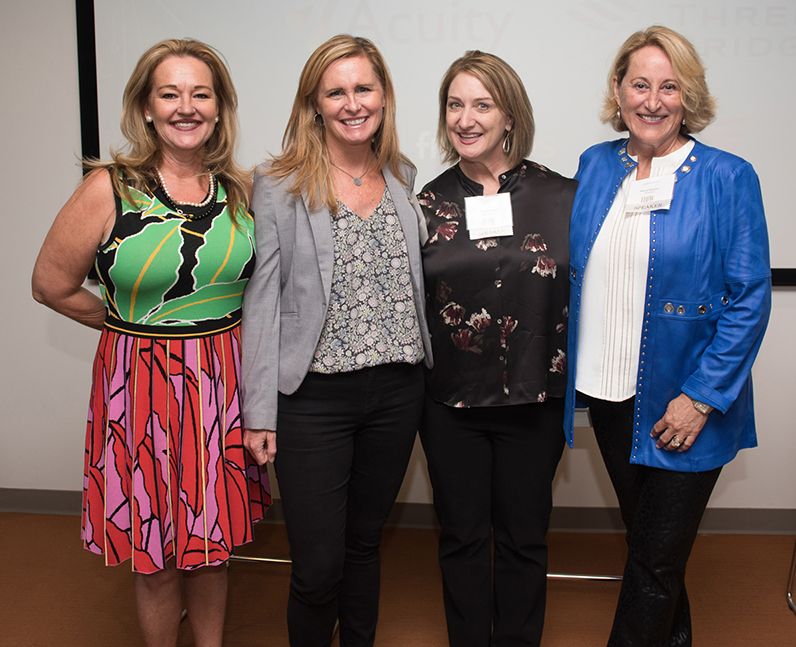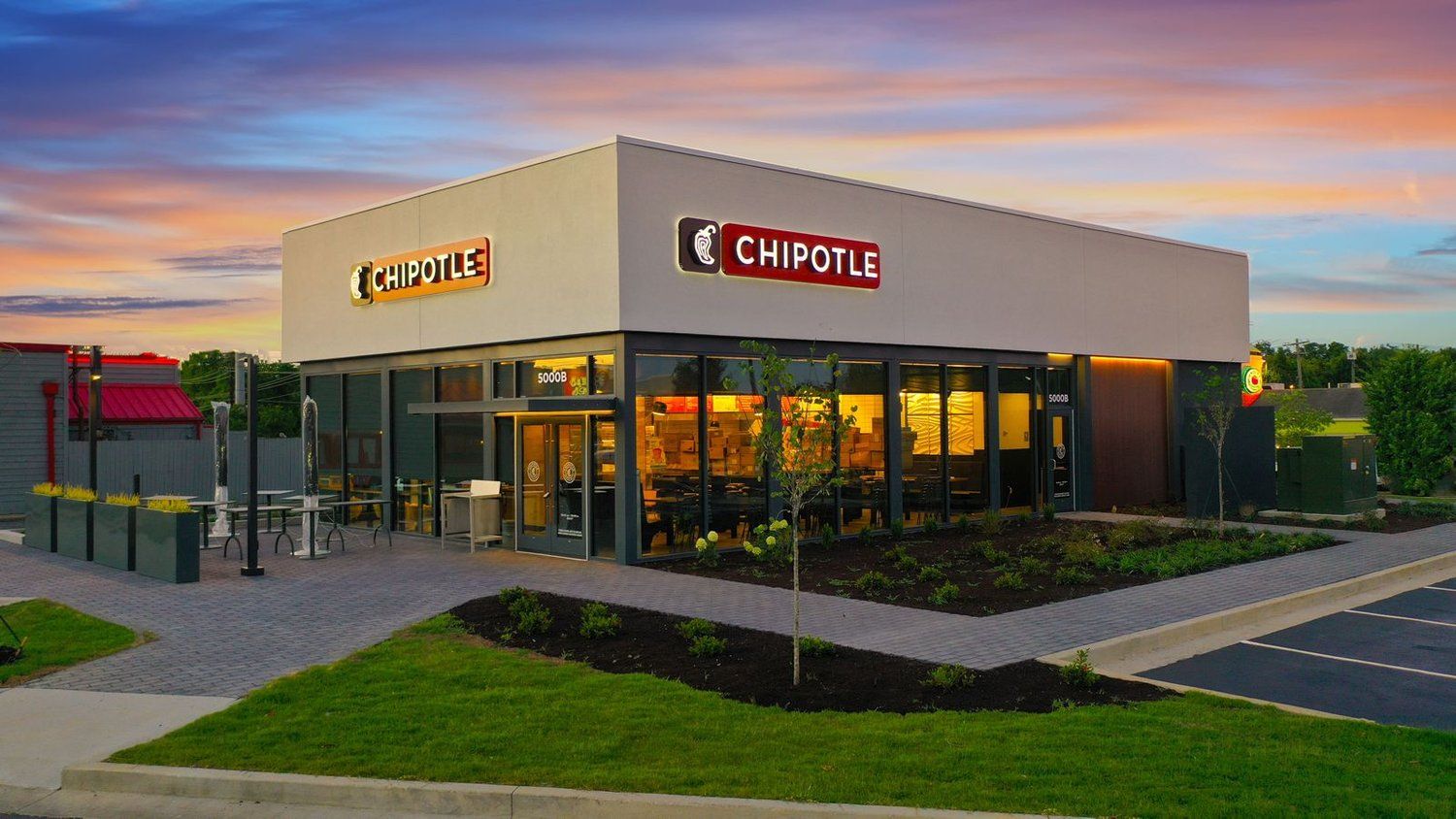Tampa Bay Business and Wealth held a Tech Connect: Navigating the Hybrid Workforce, presented by PSCU, KUDUCOM, Source 1 Solutions and The Karla Dorsey Team at Compass. The event was held at the Tampa Bay Wave, in Tampa.The panel discussion was moderated by Robert Hessel, chief executive officer of Source 1 Solutions. This transcript has been edited for length and clarity.
The panel included:
Ed Buckley, CEO, FitOn Health
James Neely, SVP Sales, KUDUCOM
Carrie Charles, CEO, Broadstaff
Robert Hessel: The first question goes to Ed [Buckley]. What are the main things to consider when employing a hybrid workforce model?
Ed Buckley: Pre-2020, we were completely remote with employees in 23 different states and growing very fast. So when you think about building a remote workforce, a distributed workforce, the most important thing is to replicate, very thoughtfully, everything that would happen in the office. It’s so easy to think about, ‘What’s our file transfer or security to have oversight of people’s computers?’ But that’s the easy stuff. What about the rides in the elevators? The chit chat that goes on before, and after, meetings. The talking about your kids or your pets. That’s the stuff that makes a winning culture when you’re completely remote. One of the ways we did it was through our Slack channels.
Hessel: What does it take to have a management style for a completely remote concept?
Buckley: The worst remote managers are the people who are already bad managers in the office. They’re only focused on micromanaging. ‘I’m able to micromanage in the office, I can’t micromanage at home. This is terrible, what should I do?’ I always challenge it. When we were on our way up, during that pre-2020 period, everyone on our board was a commercial real estate person and would ask when we were going to get commercial real estate. I said, ‘Never, never, never.’ We had to push back and there was no playbook, at the time, for remote work for us to follow so I just built it.
Buckley: Someone told me, before remote work was a thing, ‘On Fridays, we get to work from home. And days we’re at home, we have different protocols, and processes, than the days we’re in the office.’ And I was like, that’s horrible, and she said, ‘We dread when we come into the office because reporting is different than the days when we’re at home.’ And so even as we grew the business, so many people were in Tampa, and we had the same reporting on days that we worked together and days that we were at home. The exact same protocols, processes, everything. The other thing that someone told me, a long time ago, was about a distributed office system that (functions well) when we get together, because we want to get together and people look forward to it.
We planned events for people to come to the office but with every one of those the attitude was , ‘Oh, I’m really excited to come and make that happen.’ We slashed our office budget and used it for remote gatherings and parties. Then you GET to be together, rather than having to be together.
Neely: I think one thing you bring up is the word, deliberate. When you’re managing someone remote, having that deliberate model is so important. You’ve got to make it a point with remote and hybrid employees, to build that. You’ve got to allocate the time for it. If you don’t, it doesn’t happen.
Hessel: Is it okay to use work at home as a reward?
Neely: No, no, it’s not okay.
Carrie Charles: I say no.
Buckley: Yes.
Hessel: Carrie, how is hybrid work impacting recruitment efforts, from your perspective, in IT staffing?
Charles: I’m going to be speaking not just about our view, and what we’re doing, but also what we’re hearing from other companies. What are they doing? What are they concerned about? This is one of the hottest topics right now. Every time I’m out with a client, they want to know what everyone is doing. At Broadstaff, we have a hybrid work model and we’ve had that for a while. Now, this is not natural to me. I used to think that if I couldn’t see you, you were not working. I had trust issues, not only personally but also professionally. And it would just drive me crazy. If somebody was working at home, they were not working. This was a huge transition for me. Our model is Tuesday, Wednesday and Thursday in the office, and Monday and Friday are optional remote. There are some people who will come into the office all five days.
Back to your question, which was about recruitment, there are a lot of different studies. I mean, you’re going to see something different every day but the one that I read revealed that 85 percent of workers want a hybrid model and 75 percent of companies either have a hybrid model, right now, or they’re going to implement one. It’s a fantastic benefit and recruiting tool. Typically, I would say that in 70 percent of our conversations with candidates, they ask, ‘Is it remote? Is it hybrid? Is that an option?’ It’s a big conversation and no one size fits all.
One of our clients, AT&T, is closing hundreds of offices around the country. Now this is pretty shocking. They are closing hundreds of offices and keeping nine open. Every single one of their managers has to report to an office, to a physical office. And if they don’t, they’re done – you don’t have a job. There are 60,000 people affected by this. They’re taking a hard stand. Then there are other companies with mandatory return to office programs. Amazon, Google and Meta are now going to have three days a week hybrid schedule. City Group, two days a week. Disney, four days a week. Goldman Sachs is going all in with five days a week. And this is what I found interesting. IBM’s CEO is encouraging workers to come in three days a week. In his words, he said, ‘Promotions may suffer if not.’
Back to the question, yes, it is a huge advantage when you are out there recruiting, and looking for, candidates. We’re still having trouble finding quality talent. Even in these economic conditions, it’s still challenging right now. It’s definitely perceived as a benefit but, not only that, people are saying no all the time to job offers. You would think, ‘Goodness, why are they turning down amazing job offers with phenomenal pay and compensation?’ It’s because they want hybrid or they want remote. They want that flexibility. So yes, it’s a major benefit.
Neely: My take is a little different. I feel that I’m almost bullied into offering hybrid. As it impacts recruiting, the hybrid work model lets me attract candidates from all over the nation now. If I have a job that someone can work remote for five days a week, I could hire someone from Atlanta, someone out of New York, I could hire someone from San Diego if I want to. Conversely, if I’m trying to hire someone in Tampa to work in the office, now I have a company out of San Diego, a company out of New York, a company out of Atlanta, that are all offering that person a job and they’re offering a bit higher pay. So when I have a situation where I’ve taken my time to train someone very well and they’ve progressed to a certain point, I’m a little terrified. If I’m not offering a hybrid work option, they’re an at-risk hire because someone is going to offer more money with a different culture and the option to work from home.
Employees are looking for more than just a salary and a title now. They want to have access to that thing they don’t have a lot of, which is time. Work-life balance is important to them.
Hessel: What happens when people discover that you can hire a high-level architect who makes $150,000 a year here or instead, from another country where they speak fluent English, for $25,000 a year? I think we must start thinking about the big picture because the pendulum is going to swing. It always does. What are the key advantages, and disadvantages, of implementing a hybrid workforce model compared to being fully in the office?
Neely: The advantages that I see in the work-from-home, hybrid model is the employee has control over their environment. If they like it 65 degrees, or 87 degrees, they can make it that without interrupting someone else in the office. They can have a desk they like, a chair they like. They can control their distractions at home. I think as an employee, that’s a huge positive. Other advantages to that employee, if they’re working from home, include the commute. When we commute back and forth to work, we’re spending, at a minimum, a half-hour. Even if it’s not a half hour on the road. Anyone who can work from home, is getting an hour of their life back each day, at a minimum. That’s time that can be spent with kids, with family or with friends. As an employer, my advantages, [could be] I have 100 employees who work for my organization but I only need to have space for 40 employees.
But there are some significant disadvantages. Now, an hour before a meeting with remote employees, I have to call out time to socialize. The same things I was doing naturally before are taking more time. Time is a resource. I don’t have unlimited time. When I take a half hour to do one thing, I must take a half hour away from something else. When we have something that’s taking more time than it took yesterday, it’s extremely painful.
Charles: There’s one more disadvantage to the work-from-home employee and that is that extra one hour in the morning or that extra one hour in the evening. It’s not always spent in a healthy way, it’s spent working. There’s more opportunity for burnout because people are working more when they’re working from home and that could lead into our work-life balance question. It’s very important that we, as leaders, recognize that we don’t get excited because they’re working more. It will promote burnout because they don’t really know when to stop. They don’t have that ‘I know when to shut off and go do this and go do that.’ We also have to be very careful, as leaders, that we take care of them so they can experience all of the freedom, and flexibility, that comes with that hybrid schedule.
Buckley: I agree there is the opportunity to get burnt out if you’re not a good manager and don’t make those guardrails. Your team is made up of completely different types of employees so there shouldn’t be one playbook that works for everybody.
Hessel: If you had to pick one technology that has helped you in a hybrid, work from home or a full remote scenario, what has benefitted you the most and why?
Neely: The ability to connect with someone through video, the ability to talk back and forth with different groups, the ability to join a meeting on the fly and discuss things face to face in the hybrid workforce, is a big deal.
Buckley: I’d say Slack is number one. That’s where we set our culture. The joke is that Slack is the hallway to an office. That’s where you get to learn about your coworkers, go into their environment and see their living room or their bedroom or wherever. You’re already in their house with them.
Charles: The [technology] I really want to highlight, especially for the smaller companies in the room, is Trello.
Hessel: What about culture? How does a hybrid workforce have one?
Neely: What we’ve done, as a business, is focus on our core values. We say, ‘This is not just something in the book that you need to read, this is who we are and who we want to be.’ It really caused all of us to embrace that culture of who we are, no matter if you’re in office or remote. ♦
ABOUT ‘TECH CONNECT’
TBBW’s “TECH Connect” series is an exclusive, invitation-only, event that brings together the Tampa Bay area’s top business leaders to meet and mingle. PSCU, KUDUCOM, Source 1 Solutions and The Karla Dorsey Team at Compass were presenting sponsors. The host sponsor was the Tampa Bay Wave.
Partnering with TBBW on future editions provides an opportunity to network with the area’s business elite, generate new business opportunities and increase brand awareness.
For information about event sponsorship opportunities, email Jason Baker at
[email protected].



